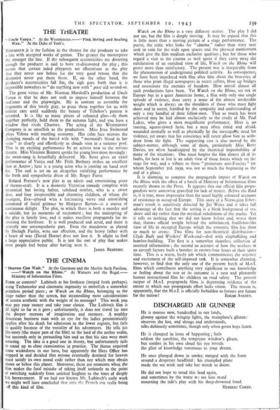THE CINEMA
" Heaven Can Wait." At the Gaumont and the Marble Arch Pavilion. —" Watch on the Rhine." At Warners and the Regal.— Ministry of Information Films.
Foam or content? Lubitsch at his frothiest (insipid froth perhaps), using Technicolor and cinematic ingenuity to embellish a somewhat pointless period piece ; or Watch on the Rhine, belonging to the stage rather than the screen, but steamrolling most considerations of screen aesthetic with the weight of its message? This week you may pay your money and take your choice. The Lubitsch film is all right so far as it goes ; unfortunately, it does not travel far into the deeper recesses of imagination and memory. A wealthy American business man with an eye for the ladies pessimistically applies after his death for admission to the lower regions, but fails to qualify because of the veniality of his adventures. He tells his life-story (the major part of the film) to the lord of-the nether realm, but succeeds only in persuading him and us that his sins were most amusing. The idea is a good one in theory, but unfortunately fails to stand up to close examination in practice. The theme required some wickedness in our hero, but apparently the Hays Office has stepped in and decided that anyone eventually destined for heaven must satisfy its own moral code rather than any which may obtain above or below this planet. Moreover, there are moments when the film makes the fatal mistake of taking itself seriously to the point of switching suddenly from satirical laughter to the tears of deeply felt bereavement. If we had not known Mr. Lubitsch's early work we might well have concluded that only the French can really bring off this kind of film.
Watch on the Rhine is a very different matter. The play I did not see, but the film is deeply moving. It may be argued that this is little more than a moving picture of a stage performance. The purist, the critic who looks for " cinema " rather than story may seek in vain for the wide open spaces and the physical momentum which give the film medium exclusive qualities; for those who regard a visit to the cinema . as wed spent if hey carry away the exhilaration of an enriched view of life, Watch on the Rhine will prove more than satisfactory. The present war is inseparable from the phenomenon of underground political activity. In consequence, we have been inundated with film after film about the braveries of those who print illegal newspapers in secret cellars, blow up bridges and assassinate the enemies of freedom. How unreal almost all such productions have been. Yet Watch on the Rhine, set not in Europe but in a quiet American home, a film with only one single episode of violence, does carry a sense of the almost intolerable weight which is always on the shoulders of those who must fight alone and in secret, fortified by the sympathy and understanding of only a tiny handful of their fellow-men. That so much has been achieved may be laid almost exclusively to the credit of Mr. Paul Lukas, who gives a most magnificent performance. Here is no roaring, square-jawed hero, but a man often timid and afraid, wounded mentally as well as physically by the inescapable need for violence, yet aware that his conscience will never allow him to with- draw from the fight. The supporting cast is also moved by the subject-matter, although some of them, particularly Miss Bette Davies, are often handicapped by the theatrical improbability of many of the situations. One must forgive the film almost all of its faults, for here at last is an adult view of those forces which set the stage for war, and a tribute to those " premature anti-Fascists " for whom September 3rd. 1939, was not so much the beginning as the end of a phase.
It is alarming to compare the propaganda impact of Watch on the Rhine with the effect of a batch of Ministry of Information films recently shown to the Press. It appears that our official film propa- gandists were somewhat gravelled for lack of matter. Before the Raid is, it is true, more impressive than the usual highly coloured accounts of resistance in occupied Europe. This story of a Norwegian fisher- man's revolt is sensitively directed by Jiri Weiss and it takes full advantage of the fact that the setting is a bleak background of sea, shore and sky rather than the mystical exhalations of the studio. Yet it tells us nothing that' we did not know before and, worse than that, throws official weight behind the unbalanced, feuilleton-like view of life in occupied Europe which the romantic film has done so much to create. Two films for non-theatrical distribution— Clyde Built and Workers' Week-end—deal with shipbuilding and bomber-building. The first is a somewhat shapeless collection of assorted information ; the second an account of bow the workers in an aircraft factory built a bomber in twenty-four hours of their spare time. This is a warm, lively job which communicates the urgency and excitement of the self-imposed task. It is somewhat alarming, however, to find that the only one of the present batch of M.o.I. films which contributes anything very significant to our knowledge or feeling about the war or its outcome is a neat and pleasantly human instructional film fo: children on road safety. The present output of M.o.I. propaganda films is depressing evidence of the extent to which our propaganda effort lacks vision. The reason is, apparently, that the M.o.I. is officially forbidden to foresee any future


























 Previous page
Previous page